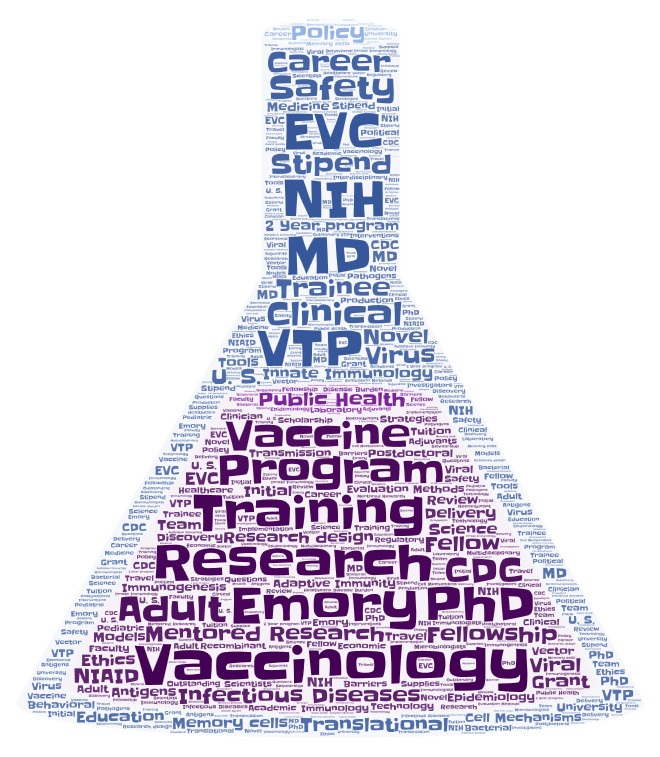
The Emory Vaccinology Training Program (VTP) was created in response to an urgent need to train a new generation of researchers in the field of vaccinology. Vaccines have made an unparalleled contribution to preventive medicine – their successful introduction and widespread use has resulted in the eradication of smallpox, the elimination of wild polio virus from most parts of the world, and a 95 percent or greater reduction in morbidity within the United States as compared to representative 20th century rates for at least six other vaccine-preventable childhood diseases. While vaccines do hold great promise for reducing disease burden, a new generation of scientists is needed to address difficulties that have plagued efforts to develop and deliver additional needed vaccines for infectious diseases like HIV/AIDS, malaria, hepatitis C, and tuberculosis and for other disabling diseases such as cancer and dementia.
The training objectives and goals of the Emory VTP include:
- To continue implementing our systematic approach for identifying, recruiting, and retaining highly qualified, motivated, and diverse postdoctoral trainees into the VTP-T32.
- To provide each trainee a rigorous and tailored curriculum covering key aspects of vaccinology, a robust hands-on mentored research project, and career mentoring.
- To expand our integration of the strong basic science, translational research, implementation science, clinical trials, and vaccine policy programs at Emory into a multi-faceted training experience and inclusive environment promoting collaborations and interdisciplinary approaches.
This program is sustained through funding from the NIAID of NIH under grant 5T32AI074492.
How to apply: open for applications
Program Information
The Emory Vaccinology Training Program (VTP) was initiated in 2009 with NIAID funding through a T32 training grant. Our program is focused on postdoctoral fellows (e.g. PhD, MD, MD/PhD). Over time, the program has expanded to six fellow slots due to supplemental funding from the CDC which is dedicated to vaccine safety.
We have successfully undergone three competitive renewal processes at NIH. During this program’s 15-year history, we have had three directors (Drs. Mulligan, Orenstein and Rouphael). Currently Drs Rouphael, Lopman and Amara lead the program.
Since 2009, we have graduated 33 fellows (MD, PhD, and MD/PhD) with more than 180 peer-reviewed publications. VTP-T32 graduates have a strong career track record with 94% staying in government, industry or academia, and among them 87% are thriving in vaccine-related fields. In addition, a total of 145 grants from a variety of funding sources have been awarded to our graduates.
The VTP-T32 has a strong history of dedicated faculty mentors with a breadth of knowledge expanding all the disciplines available for fellows to train. It is with their mentorship, the VTP-T32 fellows have experienced tremendous career success.
The breadth of training experiences reflects the broad array of disciplines comprising vaccinology research. More information on our training content opportunities can be found throughout our website.
Research Training Sections
- Pathogenesis and vaccine discovery (PVD)
- Immunology (IMM)
- Epidemiology (EPI)
- Translation, delivery, and clinical trials (TDC)
- Implementation Science and Health Policy (ISHP)
- Vaccine safety (VS)
- Bioinformatics & Computational Vaccinology (BCV)
Training and Educational Opportunities
Responsible Conduct of Research (Ethics)
Course Description: N/A
Vaccines and Vaccine-Preventable Diseases (GH 571)
This course will help fellows develop an in‐depth understanding of epidemiological, biological, and applied aspects of commonly used vaccines and vaccine-preventable diseases (VPDs) of public health importance. The course content will be structured to review specific vaccines and VPDs (rather than overarching aspects of immunization programs covered in GH 566/EPI 566). Where relevant, the course lectures will use examples from both developed and developing countries.
Immunization Programs and Policies (EPI 566)
Provides an introduction to the entire spectrum of vaccines and immunization, including basic bench research through testing, licensure, and use; program design, implementation, and evaluation; and social, economic, and political factors affecting the use of vaccines. Primary emphasis will be on the international setting, but examples will also be taken from developed countries. Cross-listed with GH 566.
Epidemiologic Methods for Vaccine Evaluation
This course examines the ongoing evaluation of vaccine effectiveness after licensure, emphasizing how effectiveness can vary over time, by population, and setting. It covers epidemiologic methods, study designs, and data sources used to assess vaccine effectiveness and safety. The course also explores causal inference methods, quantification of population-level impact, including indirect effects, cost-effectiveness of vaccine programs, and vaccine hesitancy.

